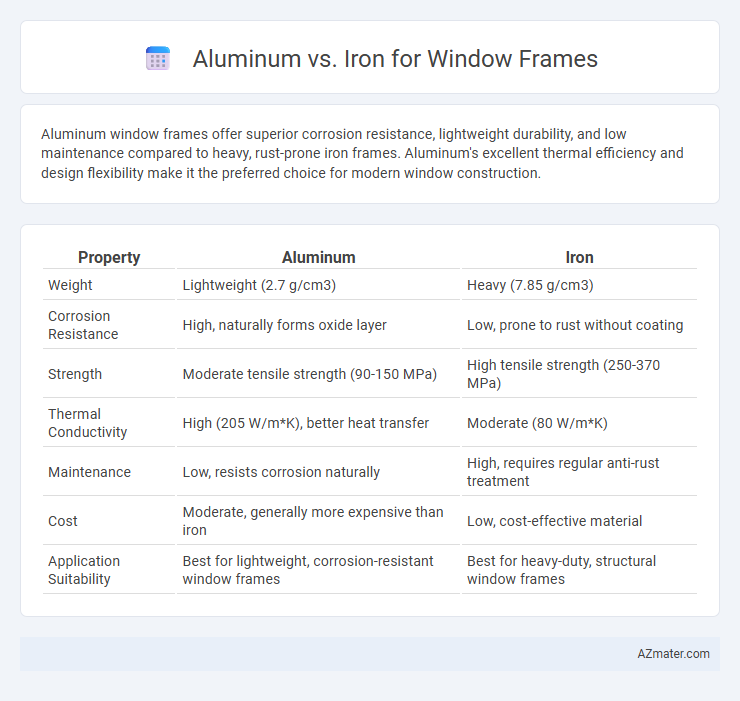Aluminum window frames offer superior corrosion resistance, lightweight durability, and low maintenance compared to heavy, rust-prone iron frames. Aluminum's excellent thermal efficiency and design flexibility make it the preferred choice for modern window construction.
Table of Comparison
| Property | Aluminum | Iron |
|---|---|---|
| Weight | Lightweight (2.7 g/cm3) | Heavy (7.85 g/cm3) |
| Corrosion Resistance | High, naturally forms oxide layer | Low, prone to rust without coating |
| Strength | Moderate tensile strength (90-150 MPa) | High tensile strength (250-370 MPa) |
| Thermal Conductivity | High (205 W/m*K), better heat transfer | Moderate (80 W/m*K) |
| Maintenance | Low, resists corrosion naturally | High, requires regular anti-rust treatment |
| Cost | Moderate, generally more expensive than iron | Low, cost-effective material |
| Application Suitability | Best for lightweight, corrosion-resistant window frames | Best for heavy-duty, structural window frames |
Introduction to Window Frame Materials
Aluminum window frames are lightweight, corrosion-resistant, and require minimal maintenance, making them ideal for modern architectural designs. Iron window frames offer superior strength and durability, providing enhanced security but often require regular treatment to prevent rust. Choosing between aluminum and iron depends on factors like climate, budget, and desired aesthetic.
Key Differences Between Aluminum and Iron Window Frames
Aluminum window frames are lightweight, corrosion-resistant, and require minimal maintenance, making them ideal for modern, energy-efficient buildings. Iron window frames offer superior strength, durability, and security but are prone to rust and heavier installation requirements. Thermal insulation in aluminum frames can be enhanced with thermal breaks, whereas iron frames naturally provide excellent thermal mass but may require protective coatings to prevent corrosion.
Strength and Durability Comparison
Aluminum window frames offer excellent corrosion resistance and maintain structural integrity in harsh weather conditions, making them highly durable with a strength-to-weight ratio that surpasses iron. Iron frames, particularly wrought iron, provide superior tensile strength and rigidity but are prone to rust and require frequent maintenance to prevent degradation. When comparing strength and durability, aluminum frames provide a lightweight, rust-resistant solution ideal for modern construction, while iron frames offer robust strength but need protective coatings for long-term durability.
Thermal Efficiency and Insulation
Aluminum window frames have lower thermal efficiency due to high thermal conductivity, causing more heat transfer and energy loss compared to iron, which naturally offers better insulation. Iron frames can retain heat longer, enhancing insulation and reducing heating and cooling costs, but are heavier and prone to rust without treatment. Thermal breaks in aluminum frames improve insulation by reducing heat flow, making them more competitive in energy efficiency when combined with modern technology.
Maintenance Requirements
Aluminum window frames demand significantly less maintenance compared to iron, as they resist rust, corrosion, and fading without requiring frequent repainting. Iron frames need regular treatment, including sanding, priming, and painting, to prevent rust and maintain structural integrity over time. The durability and low upkeep of aluminum make it a cost-effective and practical choice for long-term window frame maintenance.
Aesthetic Appeal and Customization Options
Aluminum window frames offer sleek, modern aesthetics with a smooth finish and are available in a broad spectrum of colors and anodized or powder-coated finishes for enhanced customization. Iron frames provide a classic, elegant look with intricate designs and can be customized through forging and wrought detailing to create unique, ornamental styles. Both materials allow for tailored design choices, but aluminum excels in offering a lightweight profile with diverse color options, while iron is favored for its robust, decorative appeal.
Cost Analysis: Aluminum vs Iron
Aluminum window frames generally cost more upfront than iron frames due to the higher price of raw materials and manufacturing processes. Despite the initial expense, aluminum offers better long-term value because of its durability, corrosion resistance, and lower maintenance costs compared to iron, which often requires frequent painting and rust prevention treatments. Total cost of ownership favors aluminum when factoring in longevity, maintenance, and energy efficiency benefits over the lifespan of the window frame.
Environmental Impact and Sustainability
Aluminum window frames offer superior sustainability due to their high recyclability, consuming up to 95% less energy during recycling compared to primary production, which significantly reduces environmental impact. Iron frames, while durable, have a higher carbon footprint owing to energy-intensive extraction and processing methods, leading to greater greenhouse gas emissions. Choosing aluminum supports long-term environmental goals by minimizing resource depletion and promoting a circular economy in building materials.
Security and Safety Considerations
Aluminum window frames offer superior resistance to corrosion and require less maintenance, enhancing long-term security by maintaining structural integrity against forced entry and weather-related wear. Iron frames provide exceptional strength and durability, offering higher resistance to physical attacks and increased security, but they demand regular maintenance to prevent rust and deterioration that could compromise safety. Choosing between aluminum and iron for window frames depends on balancing corrosion resistance and maintenance needs against the strength and robustness necessary for optimal security and safety.
Conclusion: Choosing the Right Material for Your Window Frame
Aluminum window frames offer superior corrosion resistance, lightweight durability, and require minimal maintenance, making them ideal for modern, energy-efficient designs. Iron frames provide exceptional strength and a classic aesthetic but demand regular upkeep to prevent rust and weather damage. Selecting between aluminum and iron depends on balancing factors like longevity, maintenance effort, thermal efficiency, and style preferences for your specific window frame needs.

Infographic: Aluminum vs Iron for Window Frame
 azmater.com
azmater.com